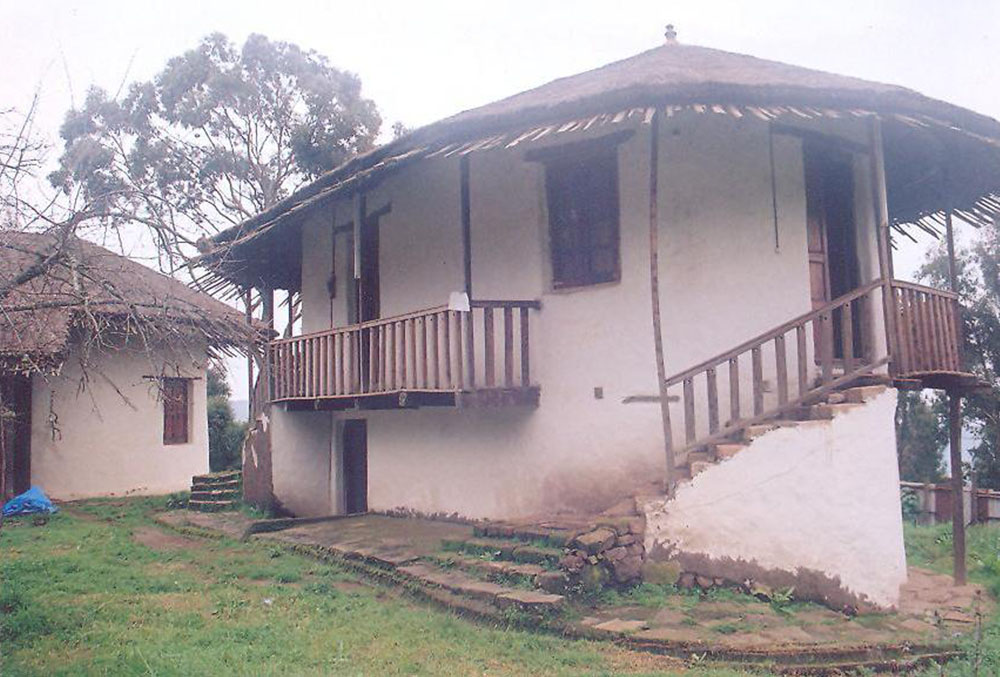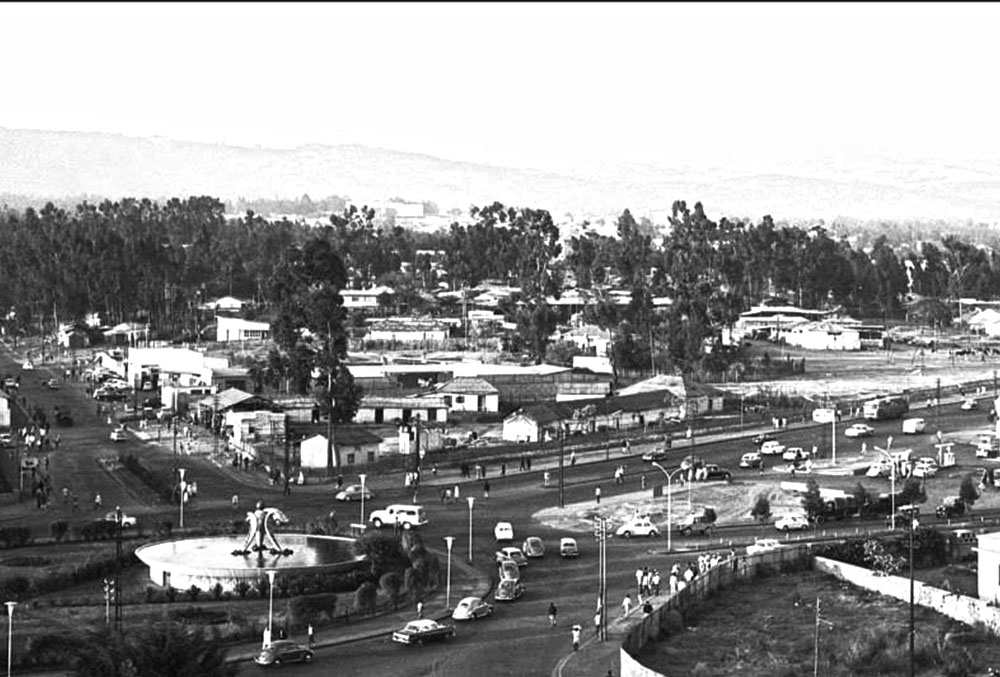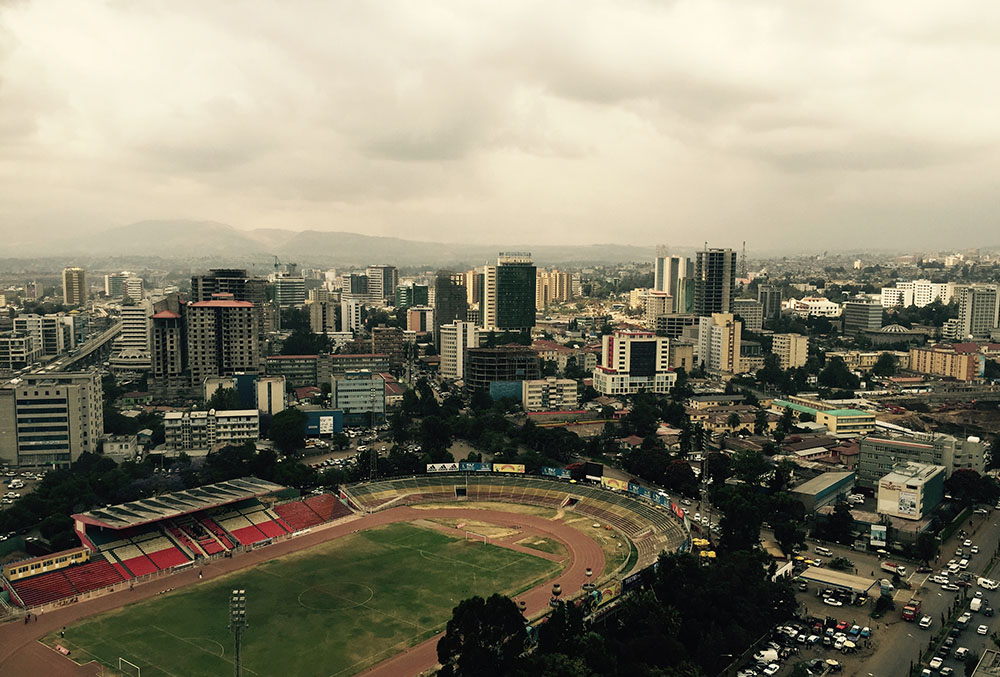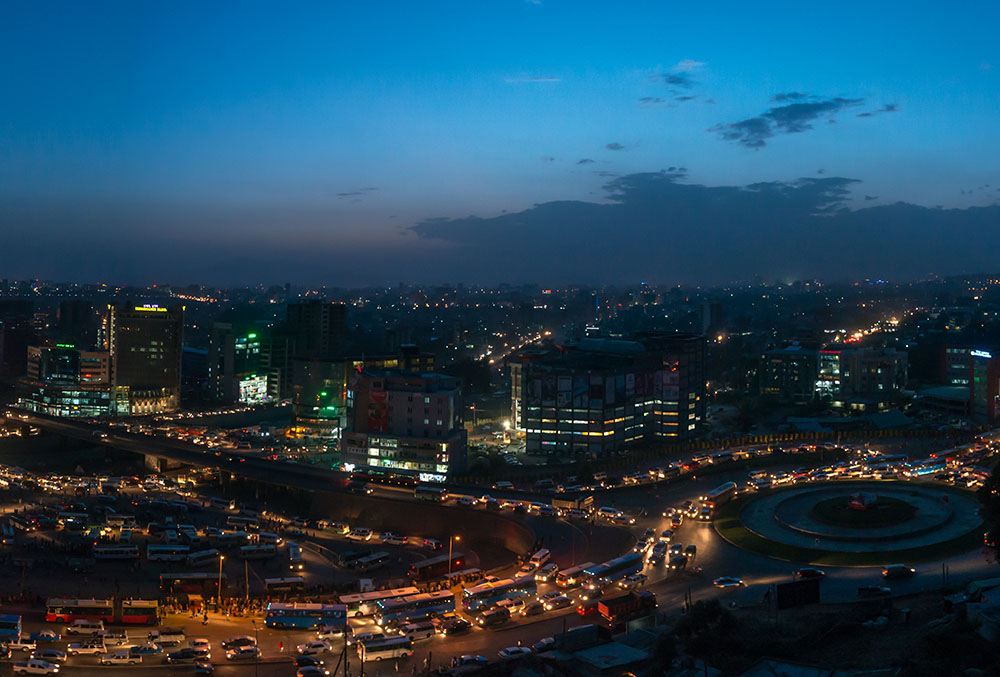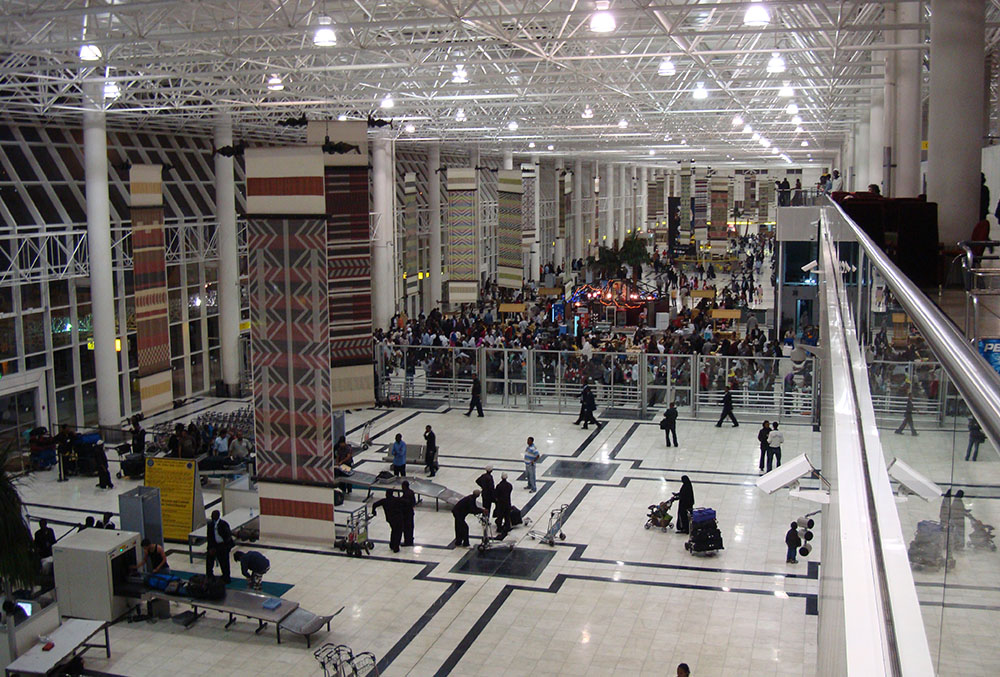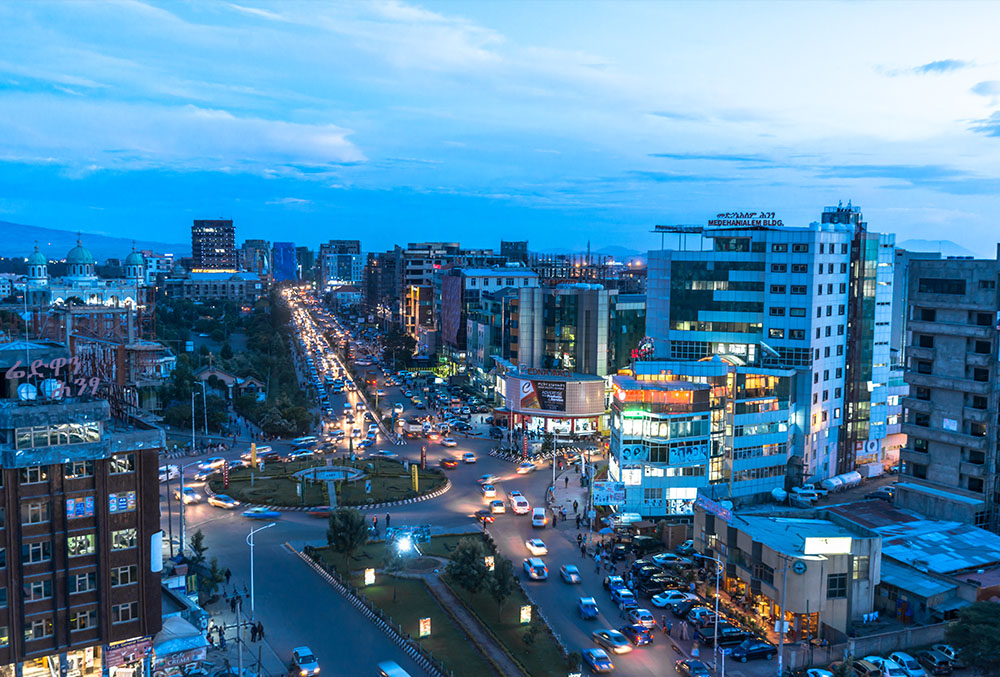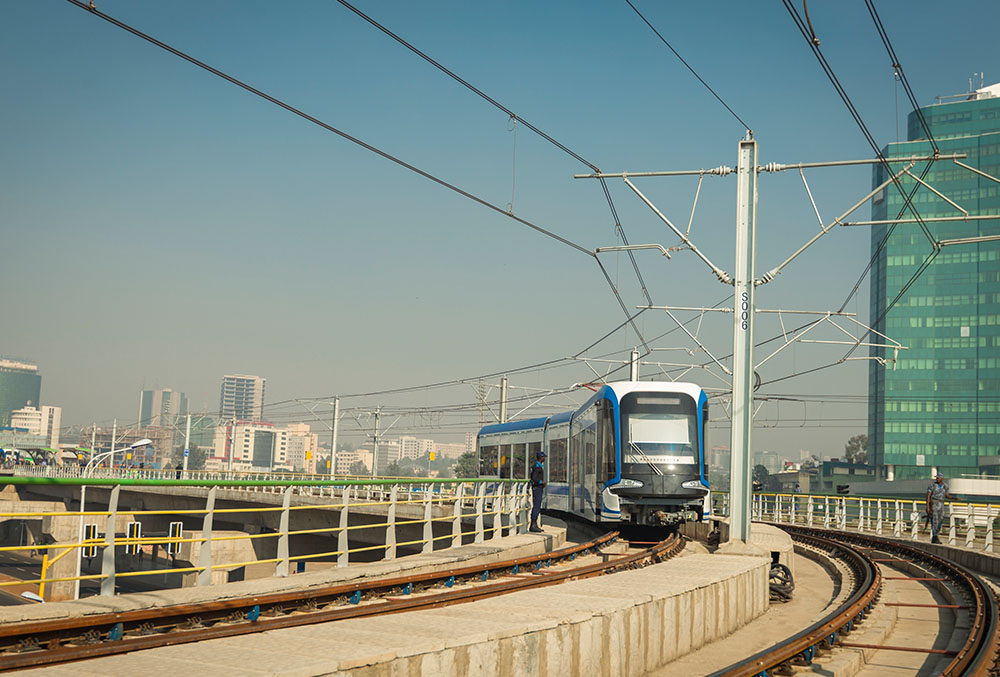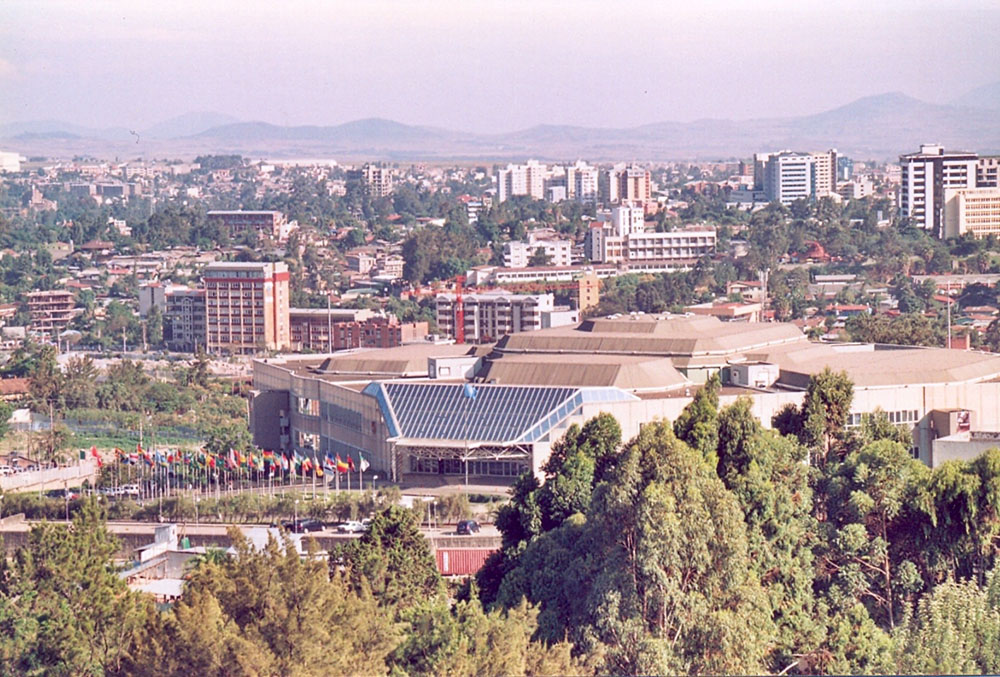Altitude & Location
Addis Ababa, the largest city in Ethiopia and the seat of the Federal Government, lies on the central plateau, 90 of north of the Equator. The city is located at the heart of the country, at an attitude ranging from 2,100 metres at Akaki in the south to 3,000 metres in Entoto Hills in north. This makes Addis the third highest city in the world, after La Paz and Quito in Latin America. Addis Ababa is fringed by Zuquala, Erer, Furi, Wecheha and Menagesha mountains that rise to over 3,000 meters. These mountains naturally regulate the climate of Addis Ababa, keeping it a pleasantly mind throughout the year – ideal for visitors. Characterized by wide avenues and fine architecture, the capital is a delightful place to explore.
The Entoto and its neighbouring hiils lie between the watersheds of the Blue Nile to the northwest and the Awash to the south. The Entoto area is rugged with typically volcanic features and steep topography, while the central and the southern part of Addis are characterized by gentle and rolling topography. The city has grown at an astonishing rate since it was founded over 127 years ago. Covering 540 square meters, the capital is endowed with green hillsides generating rapidly flowing streams, along with hot springs – one of the major reasons why it was chosen as the capital.
Founded by Emperor Menelik II, today the city has a population of about 5 million. As it is the seat of the headquarters of the United Nations Economic Commission for Africa (UNECA), the African Union (AU) and other regional and international organizations, Addis is the diplomatic capital of Africa. Moreover, the presence of more than 100 Embassies and consular missions has enabled it to serve as the venue for international conferences and other gatherings, and stand fourth among the most important centres of international organizations and Embassies after Washington DC, New York and London.
Climate
Despite its relative proximity to the equator, the lofty altitude helps Addis Ababa enjoy a mild and hospitable tropical highland climate with an average temperature of 160 centigrade. The high altitude has a cooling effect and hence the temperature does not vary significantly throughout the year. many visitors, who expect the climate to be more tropical like other cities near the equator, are pleasantly surprised to find the climate so mild when they visit Addis Ababa.
The month from June to mid-September is the main rainy season during which days are nights are cool by local standards. Average annual rainfall is 1,160mm, of which is about 80% falls between June to September, the months of July and August being the wettest. The hottest and driest months are usually April and May, when they days are pleasantly warm to hot and the nights are cool. The short rains falls during March to mid April, characterized by relatively cool nights are warm days.
Sites and Facility
The city boasts of four old palaces, many churches and mosques, about 13 monuments, 10 museums and a number of parks and markets – with Mercato the largest in Africa.
Facilities
Hotels in Addis Ababa vary from luxury to plenty of good tourist standard hotels. The city has a lot of small hotels that provides accommodation and restaurant facilities. Reservation at the major hotels can be made through online travel websites, travel and tour agents as well as by direct contact.There is more than enough for anybody to see and do in Addis, including numerous restaurants offering exotic dishes from many parts of the world. Ethiopian food is served at the most of the restaurants and there are also Chinese, Italian, French, Indian, Armenian, Arabic, Greek, Turkish, and many other specialist restaurants. Indeed, it is possible to eat your way round the world without ever leaving Addis Ababa. If you’d just like to relax and have fun with an Ethiopian spin to it, visit the traditional Ethiopian Restaurants which serve wonderful Ethiopian fare and usually feature a local “Azmari” band and traditional dancing.
On the entertainment side, several cinemas show international films including local with English dialogues or sub-titles. Most of these cinemas also stage dramas in Amharic depicting Ethiopia’s social and cultural life during different historical epochs. For more international recreational service, there are scores of cafes, discos, and art galleries in the city. Shopping in Addis is a delight and the shops are well stocked with most consumer goods. The local jewelry, sold by weight of gold or silver, is in particularly high demand. For a modern shopping experience, Bole (en route to the airport) has sprouted several new malls and shops and has become one of the most popular areas in the city. In the city centre, the older Piazza district is renowned for its gold and jewelry shops but, if the visitor is just looking for souvenirs of Ethiopia, a walk up Churchill Road will be fruitful.
Addis Ababa is generally a very safe city in which to stroll and explore. Ethiopians are traditionally very courteous and helpful to visitors and visitors should experience nothing but kindness as they explore the city.
When it’s time to leave there are ample opportunities to do some last-minute shopping to those important duty-free items or mementoes at Addis Ababa Bole International Airport.
The modern state-of-the-art Addis Ababa Bole International Airport is one of the best airport terminals in Africa, not the least for its selection of shops, café’s, banking facilities and other services. If you haven’t travelled to Addis in a while, you’re in for a pleasant surprise.
Getting About
Transport in the city is plentiful, starting with a free shuttle bus from the airport into the city run by the national carrier, Ethiopian Airlines, and both regular taxies and contract taxis are available 24 hours a day as well as minibuses and cars to hire.
Currently there are more than 86 ground tour operators, details of which can be obtained from the ticket offices of the national carrier, Ethiopian Airlines, and other international airlines which serve Ethiopia.
Other tourist facilities of Addis Ababa include 140 travel agencies, 145 souvenir shops, more than 120 government and private bank branches, communication and entertainment facilities, utilities, tourist taxis, transfer cars etc.
Postal Services
The Ethiopian Post Office manages both domestic and international mail services. There are also express mail and package carriers such as the Ethiopian Message Service (EMS), DHL, TNT, Fedex etc.Telecommunications
Ethiopia is in the process of improving its telecommunications facilities, which are already relatively efficient by sub-Saharan African standards. Direct microwave links connect all regional cities and a number of smaller towns have automatic telephone services. Excellent international communication links are maintained through two earth satellite stations providing telephone, telex, fax, e-mail, mobile telephone and television services. Microwave links exist with Kenya and Djibouti. Digital telephone exchanges have been installed. Together with the digitalization of the exchange, additional facsimile, telex and data transmissions are widely used.Banking
Efficient banking and other financial services are available in the city. While the National Bank of Ethiopia (NBE) serves as the central bank, commercial banking functions are performed by a state-owned commercial bank and a number of newly emerged private banks. The commercial banks offer savings and current accounts, extend short-term loans, deals in foreign exchange transactions, provide mail and cable money transfer services, participate in equity investment, provide guarantee services and perform virtually all other commercial bank facilities.
There are also two specialized banks: the Development Bank of Ethiopia (DBE) and the Construction and Business Bank (CABB). DBE extends short, medium and long-term loans for viable development projects, including industrial and agricultural. It also provides other banking services, such as cheque and saving accounts to its clients. The CABB provides long-term loans for construction, acquisition or maintenance of dwellings, community facilities and real estate development. In addition, it offers all other commercial banking services for the business community.
Currency & Regulations
The monetary unit of Ethiopia is the “Birr” with the par value subject to change every week against other major international currencies. Copper coins are circulated in values of 1 5 10 25 50 and one Birr. Notes are printed in denominations of 1 5 10 50 100 Birr.
Currency Regulations
There is no restriction on the amount of foreign currency which can be imported to Ethiopia. This can be in the form of cash, travellers’ cheques and letter of credit or the major credit cards such as American Express, Visa, and MasterCard etc. The National Bank of Ethiopia and its authorized agents are entitled to exchange foreign currency against receipts.Costumes & Revenue
Visitors are allowed to import items duty free, limited to 500cc (1/2 litre) of perfumes, one liter of alcoholic liquor, 25o grams of tobacco, 100 cigarettes and 50 cigars. Professional articles and samples, including those imported by business and commercial travellers, items like camera (film), photographic equipment, radio equipment and sound recording apparatus and equipment imported by foreign correspondents or any other specialized materials imported for professional use, require a special permit from the Ministry of Information and Culture. Sporting firearms are subject to special permit obtainable for the environmental and wildlife protection Authority Addis Ababa.
Visa & Residence
Visas may be secured promptly upon application to an Ethiopian Diplomatic or Consular Mission abroad or upon arrival at Addis Ababa Bole International Airport in Addis Ababa. An Entry Visa upon arrival cost Birr 140. Visas are renewable for three months. Visitors who stay for more than 30 days must report to the immigration office and secure an identity card. An Exit Visa is issued upon presentation of the identity card to the immigration office.
Visas are not required for transit passengers. This stands for 72 hours but may be extended to seven days. Business Visas are issued for a month and renewal is possible if arranged by a local organization.
Residence Permit
A residence permit will be issued to a foreign investor upon submissions of an investment permit issued in his/her name by the Ethiopian Investment Commission to the Security Immigration and Refugee Affairs Authority.
Arriving and Departing
Addis Ababa Bole International Airport, with its International Passenger Terminal Building, is 5 kilometers from the city centre. Facilities for waiting passengers include banks, internet café’s and souvenir shops boasting Ethiopia’s fine crafts in silver, cotton and leather.Airport Service Charge
An embarkation fee of USD 20 per person is payable when leaving Ethiopia. The fee can be paid either at the airport or any ticket agent’s office.Calendar & Time
The use of the Julian calendar was discarded by Europeans some 400 years ago. However, Ethiopia still uses the Julian, which divides the year in to 12 months of 30 days each, with the remaining five days constituting the short 13th month of “Pagume” (In Greek Pagume means “Additional”). The Ethiopian New Year commences on the 11th September (Gregorian Calendar) every year. Ethiopia is in the GMT+3 time zone.
